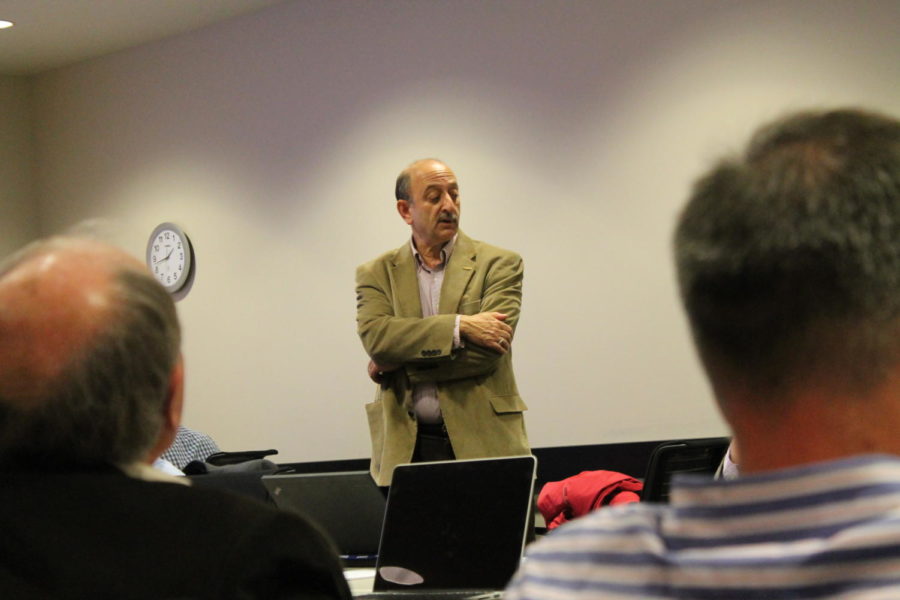‘Closing the Yield Gap’ symposium comes to Ames
Richard Martinez/Iowa State Daily
Max Rothschild, co-director for the Global Food Security Consortium, speaks in front of faculty and professors in the Seed Science Center at Iowa State. The Consortium will host a symposium on global food security on April 29 and 30.
April 29, 2014
“Closing the Yield Gap” is the second symposium that will be held as part of the Leroy and Barbara Everson Seed & Biosafety Symposium series that was launched in 2013.
The symposium will be held April 29 through April 30. The symposium will be held at the Gateway Hotel and Conference Center in Ames.
“Closing the Yield Gap” will focus on innovation in science for global food security.
“A yield gap is the gap between what should be able to be produced and what is actually delivered for people to eat,” said Max Rothschild, co-chairman of the Global Food Security Consortium and distinguished professor of animal science.
The event is free to ISU students, faculty and staff. The symposium is a two-day event with a variety of sessions related to feeding the world.
The Global Food Security Consortium and Seed Science Center at Iowa State University invited speakers and experts from all over the world to present their current research and data on global food security.
State and world leaders, researchers, faculty and students will be in attendance. Approximately 200 people from Iowa State, other universities around the world, private industry and more will be in attendance.
Speakers and experts include Catherine Woteki, the United States Department of Agriculture’s under secretary for Research, Education and Economics, as well as chief scientist for the department; Donald Nkrumah, a senior program officer with the Bill & Melinda Gates Foundation, a non-profit organization that works to tackle world problems like poverty and hunger while advocating advances in science; Kenneth Cassman, a professor of agronomy at the University of Nebraska-Lincoln; and Jerry Glover, a senior sustainable agricultural systems adviser for the U.S. Agency for International Development.
“The main goal of the event is to discuss issues with food security and look at ways we can work together to discover solutions,” said Amy Pilcher, graduate in accounting and program coordinator for the Brenton Center for Agricultural Instruction and Technology Transfer. “[The Consortium] promotes research efforts that aim to solve the issues of world hunger and food security.”
The consortium also looks at every step of the food chain by conducting research, education and engagement programs. The organization looks at six different areas — germplasm and seed systems, climate resilient healthy crops, climate resilient healthy animals, sustainable water systems, post-harvest and utilization, and policies, regulations and trade.
The Seed Science Center at Iowa State researches the production, quality and utilization of seeds through testing. It is important to improve how technology is transferred and to guarantee it goes to those who need it the most.
By 2050, the world’s population increase will be significant. The world will face hunger and poverty if the bridge between what is being produced and what is being delivered does not change. It is important that research, education and outreach is done in order to inform the public to help identify a solution, Rothschild said.
“We hope to educate students, faculty and researchers in the issues about the yield gap and, more importantly, work together to identify solutions to reduce the yield gap,” Rothschild said.







